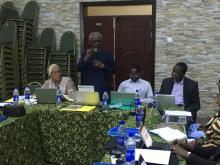Federal Government of Nigeria repositions Polio Committees towards meeting eradication certification standards
Abuja, 09 March 2018 - The Federal Ministry of Health (FMOH) through the National Primary Health Care Development Agency (NPHCDA), in collaboration with the World Health Organization (WHO) and Centers for Disease Control and Prevention (CDC) has inaugurated polio committee with new members.
The objective is to reinvigorate the committees and reposition them, as the country enhances its processes towards obtaining a polio-free status. Global Polio Eradication Initiative End Game Strategic Plan envisaged ending polio by 2018; unfortunately, Nigeria is behind in meeting the objective with resurgence of wild poliovirus in August, 2016.
In her remarks during the inauguration of the committees, Dr Dorothy Nwodo, Director for Disease Control and Immunization at NPHCDA noted that “the country depends largely on your expert contribution to PEI, provision of regular guidance to the country and feedback to the African Regional Certification Commission (ARCC) on progress made by the country’’. The reviewed National Certification Committee (NCC) and National Polio Expert Committee (NPEC) have a membership of seven members each while the National Task Force on Laboratory Containment (NTF) has ten members.
The NCC is an independent body established in Nigeria in 2001 to guide the polio eradication program and make necessary recommendations as well as report on the progress on eradication activities to the ARCC. The NPEC established in the same year as the NCC classifies AFP cases and makes appropriate recommendations to the program though the NCC. The NTF established in 2014, is a sub-committee of the NCC that deals with poliovirus containment. ARCC was established in 1988 to provide oversight function to the national polio committees.
For the first time since establishment in 2001, the Nigerian government through NPHCDA decided to dissolve the NCC and NPEC on 19 February 2018, paving way for a reviewed membership. NPHCDA, at the same event, dissolved the National Expert Committee on AEFI (NEC). The inauguration was immediately followed by an orientation of both old and new members on their roles and responsibilities.
Both committees were convened, the following week after inauguration in Calabar, Cross Rivers State from the 26th to the 28th of February 2018. During the Calabar meeting, the NPEC Chairman, Professor Mustapha Danesi, reported that a total of 12 inadequate AFP cases in 7 states (4 Borno, 2 Kano, 1 Katsina, 1 Bauchi, 1 FCT, 1 Edo and 1 Delta), out of the 118 cases presented to the committee in 2017 were classified as compatible indicating a decline from 25 compatible cases in 13 states in 2016. The remaining 106 cases were discarded. In the same light, Professor Zubairu Iliyasu, Chairman of NCC also reported that that his committee successfully reviewed the first draft of the 2017 Annual Progress Report and documented their responses to ARCC comments on the 2016 report. Three ARCC members supported the deliberations of both committees.
Following conclusion of planned sessions, the committees reiterated that government must strengthen routine immunization and build capacity of health workers on safe injection practices across all states in Nigeria. The committees agreed that NPEC will henceforth hold regular meetings and synchronize with the routine quarterly joint committee meetings.
Technical Contact:
Dr Fiona Braka; Tel: +234 703 170 5252; Email: brakaf [at] who.int

